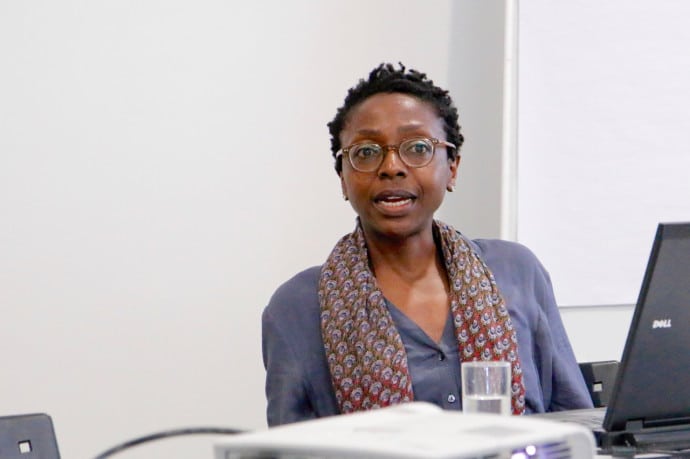“What makes a real African? What is Africanness based on? Who has the right to define Black and African? What Africa do they speak of? It’s a question of authenticity. There is a troubling domination of one vision of blackness,” said Aretha Phiri of the English Department at Rhodes University and STIAS Iso Lomso fellow. Phiri was highlighting some of the issues she addresses in her project which analyses articulations of blackness in African American and contemporary African literature written by women. The project provides a comparative analysis of leading African American author Toni Morrison’s work on blackness through the lens of contemporary female writers of the African diaspora including Zoë Wicomb, NoViolet Bulawayo, Chimamanda Ngozi Adichie and Taiye Selasi.

“Articulations of blackness have tended to be dominated by African Americans but some contemporary writers in the African diaspora are taking this to task,” she said.
“Toni Morrison is unarguably a formidable and inspiring writer,” she continued. “But her pronunciations on blackness are specific to African American ideas and experiences, which can be quite generic and hierarchical. So some aspects of her writing make me uncomfortable because they don’t resonate with my ‘African’ experiences of blackness.”
But, as Phiri also noted, there is no consensus on what ‘African’ encompasses and more contemporary writing by African writers in the diaspora has been perceived as being packaged for a Western readership and criticised for not being conversant with African everyday life. Phiri hopes to articulate more inclusive and expansive global visions of blackness and to review what it means to be African in a purportedly post-colonial, post-apartheid global milieu and imagination.
“The imperative for authentic blackness is something I’ve always grappled with,” she said. “My project speaks to my own variegated experience of black ‘Africanness’. Of trying to navigate one’s space in this world, particularly the black world.”
“Contemporary African diasporic literature addresses some of these concerns. But although academia has taken an interest in this literature, it is almost always dismissed for not being representatively African, or African enough,” she continued. “Some of the criticism these writers have faced includes that they appear to offer a culturally ‘lite’ version of Africa that embraces only enough of what is African to set them apart from Western literature,” she explained.
Conveniently described as Afropolitan and criticised for buttressing socio-political and socio-economic hierarchies, Phiri believes that this contemporary brand of African literature, premised on the existential articulations of transnational, cosmopolitan Africans, is attempting to “challenge exigencies that would deny, in the political imagination, respect for and responsiveness to the fundamental diversity and specificity of human experience”.
“To me it’s not incidental that women writers appear to be taking the lead in this regard. They are profoundly erudite intellectuals in their own right. In my mind, their writing, which advances a protean black Africanness, is concerned with transgressing prescriptive, over-determined identitarian narratives and politics,” she continued. “It is interested in imaginatively breaking through borders that define and restrict what is possible.”
“These writers are also attentive to, as Ben Okri so nicely puts it, the ‘strange corners of what it means to be human’. They are writing about Africa in very idiosyncratic ways. Suggesting something more complicated about the ‘African’ narrative and offering alternative African identities in the process. To me, these writers appear to be claiming the right to plumb the depths of our human mysteries and to examine the idiosyncrasies of our existential experience?”
Challenged to discuss the ‘less-specific texture’ of contemporary Afrodiasporic fiction in discussion with STIAS fellows, Phiri addressed the comparative neglect of authors based on the continent and the economic forces that underlie the marketing of literature. Noting that each generation of African writers seems cyclically to have to (re)produce a determinate version of what is African, she reiterated that her project attempted “to complicate blackness at the same time that it interrogated Africanness”.
“My aim is to open up spaces in which we can be honest about who we are, or at least, who we think we are.”
Michelle Galloway: Part-time media officer at STIAS
Photograph: Christoff Pauw
